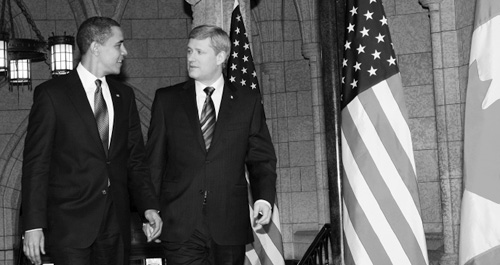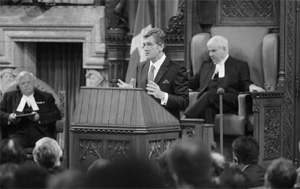Representing Canada Abroad
Another facet of the role of Members of Parliament is that of representing Canada. Parliamentary diplomacy takes Members to international meetings and on visits to promote democracy, trade and social ties. It also brings foreign parliamentarians and dignitaries to the House of Commons.
Welcoming Foreign Parliamentarians and Dignitaries
The Parliament of Canada hosted the following official visits by foreign Speakers and delegations during 2008-2009:
- May 26 to 30, 2008-His Excellency Dr. Gundars Daudze, Chairman of the Parliament of the Republic of Latvia (Saeima); and
- May 12 to 15, 2008-Mr. William Hay, MLA, Speaker of the Northern Ireland Assembly of the United Kingdom of Great Britain and Northern Ireland.
In keeping with their diplomatic function, the Speakers of the Senate and the House of Commons were involved with high-level state visits.
On May 26, 2008, His Excellency Viktor Yushchenko, President of Ukraine, was welcomed to Parliament and addressed Senators and Members of the House of Commons in a rare joint session of Parliament.
Parliament Hill's Centre Block was also chosen as the location for the first foreign visit of United States President Barack Obama on February 19, 2009. The intense media and public interest in this very successful visit required extraordinary logistical and security arrangements.

United States President Barack Obama visits Canadian
Prime Minister Stephen Harper on February 19,
2009.
Photo: © House of
Commons/Chris Diotte
The Speakers of the Senate and the House of Commons also build parliamentary relationships with other countries by receiving courtesy calls from foreign dignitaries as well as from newly accredited ambassadors to Canada and those leaving the country. In 2008-2009, the Speaker received 31 such visits.
Representing Canada's Interests and Sharing Our Experience
The Speaker and Members are frequently invited to visit other legislatures-both at home and abroad-to discuss common issues, foster relationships and share knowledge and expertise. At the invitation of his counterparts in other countries and legislatures, Speaker Peter Milliken led official delegations to the following countries and legislatures during 2008-2009:
- March 16 to 19, 2009-Edmonton, Alberta, and Regina, Saskatchewan;
- August 22 to 31, 2008-Australia; and
- April 18 to 27, 2008-Bosnia and Herzegovina, Republic of Croatia, and Republic of Macedonia.
Also, the Speaker participated in the following parliamentary conferences:
- January 22 to 26, 2009-26th Canadian Presiding Officers' Conference, Regina, Saskatchewan;
- January 4 to 7, 2009-Meeting of the Standing Committee of the Conference of Speakers and Presiding Officers of the Commonwealth, Mozambique;
- August 31 to September 2, 2008-G8 Speakers' Conference, Japan;
- July 2 to 5, 2008-Conference of presiding officers of the Assemblée parlementaire de la Francophonie (APF), Quebec City, Quebec; and
- May 22 and 23, 2008-European Conference of Presidents of Parliament, France.
Visiting and Hosting: Parliamentary Diplomacy at Work
By visiting colleagues abroad and by serving as hosts to foreign visitors, parliamentarians share ideas with their counterparts from around the world, exploring common concerns. Frequent topics of discussion include global economy, parliamentary democracy, international security, agriculture, immigration, environment, trade and international development.
The Parliament of Canada is also a member of various parliamentary associations. Each of these holds conferences and meetings. These events offer Canadian parliamentarians further opportunities to promote Canada's interests abroad and to maintain relationships with other countries.

Viktor Yushchenko, President of Ukraine, addresses a
joint session of Parliament, May 26, 2008.
Photo: © House of
Commons
Many issues that concern Canadians go beyond national borders, especially in this era of globalization. It is important for Canadian parliamentarians to understand the views and interests of other countries when decisions of those countries and international organizations can affect the daily lives of Canadians. Members of Parliament undertook a number of activities in the last fiscal year to gain understanding of some international issues.
Participating in parliamentary conferences is one manner by which Canadian parliamentarians have direct contact with their foreign counterparts. For example, in January of 2009 the Canada-China Legislative Association, in conjunction with the Canada-Japan Inter-Parliamentary Group sent a delegation of parliamentarians to the 17th Annual Meeting of the Asia Pacific Parliamentary Forum, held in Vientiane, Laos. The yearly Forum is one of the most significant and diverse gatherings of parliamentarians from the Asia-Pacific region. Canadian delegates participated in discussions of topics affecting the region, including climate change, the global financial crisis and the denuclearization of the Korean Peninsula.
Hosting seminars and events in Canada is another method by which Canadian perspectives and expertise can be shared. In June of 2008, the Canadian Branch of the Commonwealth Parliamentary Association (CPA) hosted the 20th Commonwealth Parliamentary Seminar. The event provided parliamentarians from around the Commonwealth, many from emerging democracies, with the opportunity to exchange best practices in strengthening parliamentary democracies.
Acting as international election observers is another activity that Canadian parliamentarians are often requested to undertake. The Organization for Security and Co-operation in Europe Parliamentary Assembly (OSCE PA) is very active in this domain. Its long-term objective is to further global security and promote democracy. To that end, in May of 2008 a Canadian Member of Parliament was sent to Georgia to observe the parliamentary elections in that country.
Finally, in keeping with its practice of holding international conferences, in September 2008 the Parliament of Canada hosted the Fall Meetings of the OSCE PA. Held in Toronto, the conference's theme was OSCE in an Open World: Trade, Security and Migration. While originally a total of 250 delegates (parliamentarians, staff and observers) were expected from the 56 member countries, more than 400 actually participated, due in large part to a change in the conference program. Specifically, the agenda was modified given the crisis in Georgia; the keynote address by the Foreign Minister of Georgia at the conference prompted an increased number of parliamentarians to attend and to speak about conflict resolution, an important issue for the OSCE PA.
Parliamentary Associations
The Parliament of Canada belongs to five bilateral associations and seven multilateral associations.
Bilateral associations:
- Canada-China Legislative Association
- Canada-France Interparliamentary Association
- Canada-Japan Inter-Parliamentary Group
- Canada-United Kingdom Inter-Parliamentary Association
- Canada-United States Inter-Parliamentary Group
Multilateral associations:
- Canada-Africa Parliamentary Association
- Canada-Europe Parliamentary Association (including the delegation to the Organization for Security and Co-operation in Europe Parliamentary Assembly)
- Assemblée parlementaire de la Francophonie
- Inter-Parliamentary Union
- NATO Parliamentary Association
- Inter-Parliamentary Forum of the Americas
- Commonwealth Parliamentary Association
Interparliamentary Groups
The Canadian Parliament is involved in official interparliamentary groups with Germany, Ireland, Israel and Italy. These groups promote cooperation and understanding among nations and strengthen relations between Canadian parliamentarians and their counterparts in other parliaments. Membership fees from individual parliamentarians support the groups' activities.



